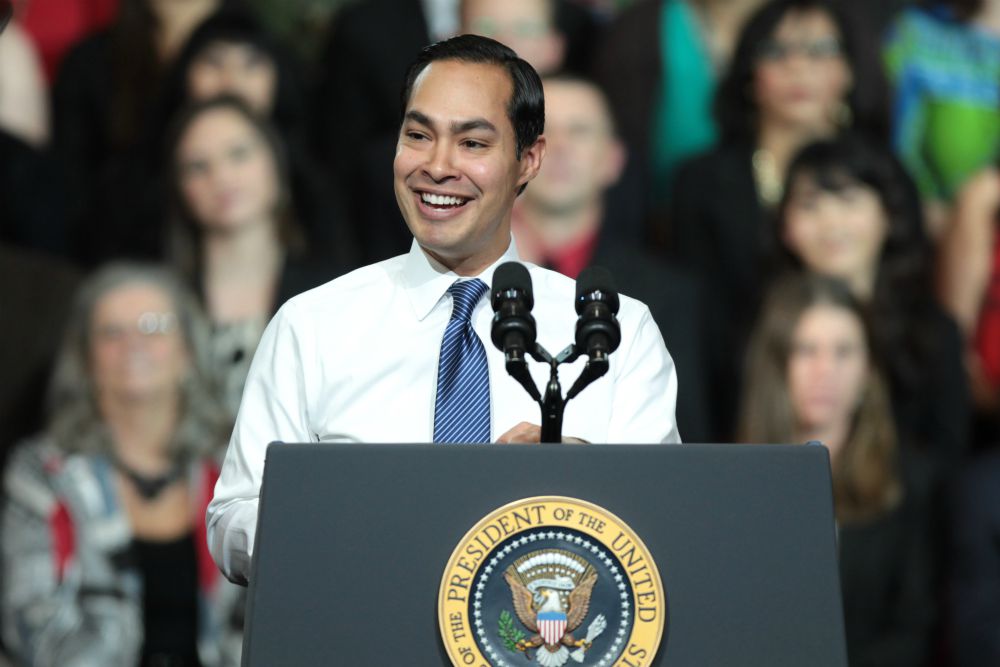
Secretary of Housing and Urban Development Julián Castro speaking at an event with President Barack Obama in Phoenix, Arizona, Jan. 8, 2015 (Wikimedia Commons/Gage Skidmore)
It is a remarkable fact that of the five serious announced candidates for the Democratic Party's presidential nomination, only two of them are guys. Today I will look at the candidacy of Julián Castro, the former mayor of San Antonio and former secretary of Housing and Urban Development, who made his announcement last month.
Castro has not gotten as much prime-time attention as the other announced candidates, Sens. Kirsten Gillibrand, Kamala Harris and Elizabeth Warren. And, while incumbent senators have a long list of recorded votes that help spell out their positions on issues, Castro's political experience is little known by comparison.
He started explaining the rationale for his candidacy in his announcement speech. If you missed it, it is worth watching. First at the microphone was his twin brother, Joaquin, who is a member of Congress. They are identical twins, and I am not sure whether that will help or hinder his campaign: Twice since Julian announced his candidacy, I have been flipping channels and seen one of the two — they are identical twins — on television, stopped to listen so I could learn more about how Julian carries himself in an interview, but it was Joaquin.
In his speech, Julian spoke movingly about his mother and grandmother. In a campaign cycle in which many women — and men! — consider electing a woman as president part of the nation's unfinished business, the candidate's tribute to the strength of character his mother demonstrated in raising her children and becoming a political activist in the West Side of San Antonio was smart politics as well as obviously heartfelt.
Castro recalled his 2012 keynote address to the Democratic National Convention in Charlotte, North Carolina, in which he said "the American Dream is not a sprint, not a marathon, but a relay." It is a strong image that creatively confronts the individualism of the culture, not by confronting it frontally but by showing how individuals can collaborate, an insight that is at the heart of whatever anti-libertarianism the Democrats will embrace in 2020. In that speech, he also performed one of the deftest takedowns of Mitt Romney ever.
In announcing his candidacy, Castro also spoke about his time as mayor of San Antonio and how he proposed an increase in the city's sales tax in order to fund universal pre-K. He explained that people told him he was crazy — "This is Texas, and we don't raise taxes in Texas." But Castro built an alliance of businesspeople and educators, as well as parents, and the voters agreed to the sales tax increase in a referendum. Focusing on businesses needing an educated workforce was a smart way of presenting the need to invest in education, but there is also a case to be made that American corporations already expect the public schools to train their workforce for them and are unwilling to invest in training their own workers.
Advertisement
I have long thought that having a term or two as a mayor was a much-needed item on a candidate's resume. Potholes are not red or blue, they just need to be filled. Mayors do not only vote on things, they have to make sure things get done. That Castro was mayor of a fast-growing, racially diverse city in Texas is all to the good, and the strongest part of his announcement speech drew on that experience.
The difficulty is that after serving as mayor, Castro became the Secretary of Housing and Urban Development. It is an important job, but it is also a job that I suspect most Americans do not know, and do not care, exists. Castro was not wrong when he talked about the affordability of housing being a problem for many millions of our citizens, but he needs to do a better job explaining how federal, state and municipal governments can work together to achieve policies that reflect what we Catholics call subsidiarity. Being tagged as a Washington bureaucrat is not the kind of tag a candidate wants.
Castro is young (44) and handsome. His voice is melodious to an extraordinary degree. I look forward to learning more about where he falls on the neo-liberal/economic populism spectrum, whether he warms to the culture wars or seeks to bracket them. It is hard to see which lane in this race he will claim as his own, but Castro has talent coming out of all pores. I would be surprised if he is not on the eventual 2020 ticket, but I do not presently see how he could make it to the top slot. Then again, at this stage in the race 12 years ago, it wasn't clear how Barack Obama was going to make it to the top spot either.
[Michael Sean Winters covers the nexus of religion and politics for NCR.]
Editor's note: Don't miss out on Michael Sean Winters' latest: Sign up to receive free newsletters, and we'll notify you when he publishes new Distinctly Catholic columns.







